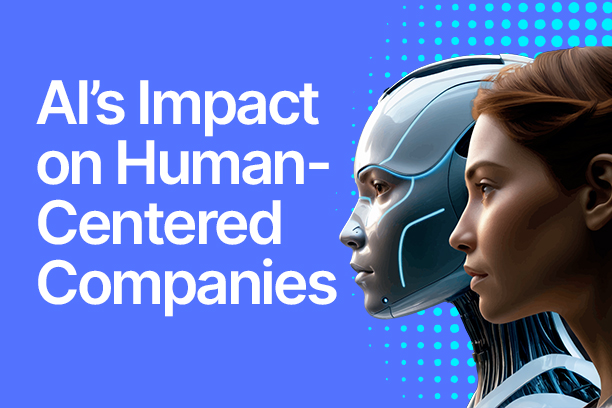Artificial Intelligence (AI) rapidly transforms industries, automates tasks, and enhances business decision-making worldwide. However, despite AI’s incredible potential, a key question arises: Will AI replace human-driven enterprises, or will companies prioritizing human connections thrive in the AI era?
The answer is becoming clear—human-centric companies will outperform AI-only models. While AI offers efficiency, trust, creativity, and emotional intelligence remains human strengths. Businesses that successfully merge automation with human-led interactions will have a significant competitive edge.
In a recent discussion on the CoinRock Show, Chris J. Snook highlighted why companies prioritizing human engagement, customer experience, and authentic relationships will continue to lead in the AI-driven future.
“Humans will always crave real, authentic connections. Businesses that amplify—not replace—the human experience will be the true winners in the AI age.” – Chris J. Snook
This article explores why AI should complement, not replace, human interactions and why business’s future belongs to companies prioritizing relationships over pure automation.
Power of AI and the Limitations
AI adoption is increasing across industries. According to PwC’s Global AI Study, AI is expected to contribute $15.7 trillion to the global economy by 2030. Businesses are leveraging AI for:
- Customer service automation (chatbots, virtual assistants)
- Predictive analytics for investment strategies
- Process automation in HR, supply chains, and operations
- AI-powered personalization for marketing and e-commerce
While AI offers immense benefits, its limitations are evident. It lacks emotional intelligence, critical thinking, and creativity, which are crucial for long-term business success.
“The companies that think they can automate everything are missing the point. AI is a tool—it’s not the product, and it’s not the experience.” – Chris J. Snook
Despite AI’s advancements, people do not form relationships with machines. The businesses that balance technology with human engagement will ultimately win customer trust and loyalty.
Human-Centric Companies Will Outperform AI Models
While AI enhances efficiency, businesses prioritizing human relationships, trust, and personal experiences will continue to lead. Studies show that 67% of consumers trust human advisors over AI-driven decisions (Edelman Trust Barometer, 2023), especially in industries like finance, healthcare, and legal services, where human judgment is irreplaceable.
AI can analyze data, but people rely on experts for investment strategies, medical diagnoses, and legal guidance. Even as AI-driven robo-advisors like Wealthfront grow, high-net-worth individuals still prefer human advisors, particularly during economic uncertainty.
“You can automate transactions, but you can’t automate trust. People will always prefer working with people when it matters most.” – Chris J. Snook
Another limitation of AI is its lack of emotional intelligence and critical thinking. A Harvard Business Review study found that companies with strong emotional intelligence have 20% higher customer retention.
AI chatbots may handle simple queries, but they struggle with customer frustrations, and AI-powered hiring tools have faced bias concerns, prompting companies to reintegrate human recruiters.
Despite AI’s rise, the demand for human interaction is increasing. Businesses experimenting with full automation, like Walmart and Costco, have reintroduced cashiers after removing self-checkouts due to customer dissatisfaction.
Restaurants are replacing kiosks with waitstaff, and luxury brands emphasize in-store experiences over AI-powered personalization. While AI is a powerful tool, companies that combine automation with personal engagement are seeing stronger brand loyalty and higher customer retention.
Merging AI with Human-Centered Business for Success
The best businesses of the future will integrate AI strategically while keeping human interactions at the core. AI should be used as an assistant, not a replacement, enhancing efficiency while retaining human oversight in critical areas.
AI can handle routine inquiries in customer service, but human agents must manage complex issues. In healthcare, AI aids diagnostics, but doctors provide final assessments. In e-commerce, AI personalizes recommendations, but human support teams resolve disputes and ensure customer satisfaction.
As AI takes over repetitive tasks, investing in employee training becomes crucial. According to the World Economic Forum, AI is expected to displace 85 million jobs by 2025 but create 97 million new roles. Companies that train employees to work alongside AI will outperform those relying solely on automation.
A key differentiator is combining AI’s efficiency with human creativity. AI can analyze marketing data, but humans craft compelling storytelling. It can aid data-driven decisions, but human insight refines strategies for cultural relevance.
While AI personalizes product recommendations, human designers drive innovation. A prime example is Apple’s Genius Bar, which balances AI-driven online support with in-store specialists, proving that technology and human service together create the best customer experience.
Future Belongs to Human-Centric AI Businesses
AI is a powerful tool, but businesses that replace human interactions entirely risk losing their most valuable asset—customer trust and loyalty.
The future of AI in business is not about replacing people but enhancing human experiences through technology. Companies that successfully integrate AI while keeping human relationships at the core will outperform purely automated models.
“The real winners in the AI-driven economy won’t be the companies that automate everything—they’ll be the ones that use AI to elevate human potential.” – Chris J. Snook
Key Takeaways:
- AI boosts efficiency, but human trust builds customer loyalty.
- The most successful companies blend automation with human-led decision-making.
- Businesses should use AI as an assistant, not a replacement for customer engagement.
- The future belongs to companies that prioritize genuine human relationships over pure automation.
As AI continues to evolve, the businesses that balance innovation with human connection will define the next generation of success.





